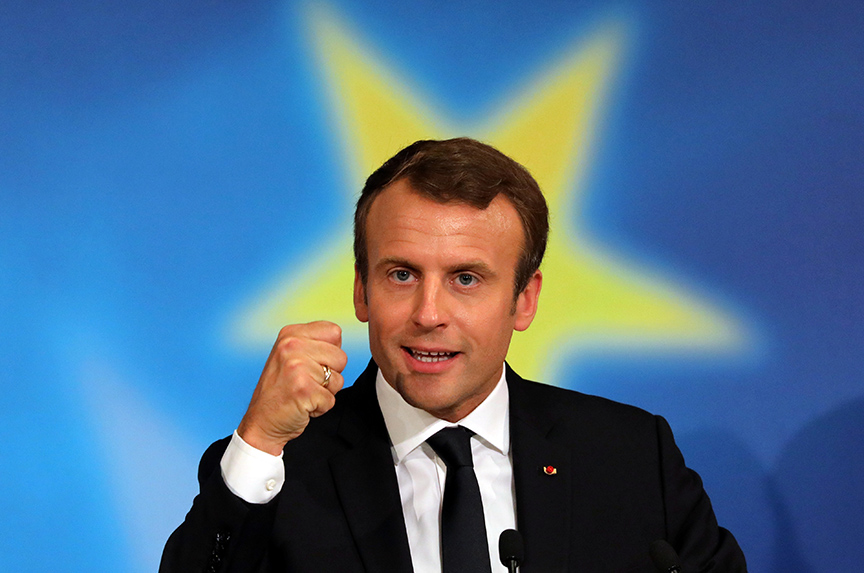 French President Emmanuel Macron’s audacious plan for “profound” changes to the European Union’s (EU) structure will leave Malta uneasy over the prospect of Europe meddling in its policies on taxation and defense.
French President Emmanuel Macron’s audacious plan for “profound” changes to the European Union’s (EU) structure will leave Malta uneasy over the prospect of Europe meddling in its policies on taxation and defense.
An ardent supporter of the EU, Malta has a tax regime that has always made the country leery of the EU’s desire to encroach on its taxation policy.
Macron, in his address at the Sorbonne University in Paris on September 26, suggested greater harmonization of Europe’s tax policies. This, he said, could be achieved through the introduction of a Common Corporate Tax Base (CCTB) and a Common Consolidated Corporate Tax Base (CCCTB).
Malta has and will continue to oppose both a CCTB and a CCCTB. If enacted, the CCTB would no longer permit companies in Europe to freely register their profits in countries with lower tax rates. While this may be seen as a way to reduce inequalities across the EU, as suggested by Macron, it would deal a massive blow to Malta’s economy as it would no longer be allowed to offer its attractive tax system. Even though Macron threatened linking countries receiving EU funds to their willingness to converge on taxation, Malta will not be willing to give up the at least €200 million it earns annually from retaining just 5 percent tax charged on foreign-generated profits.
The French president also vowed to revive the French-backed project of a financial transaction tax (FTT) to help fund overseas aid, an idea that, despite being pursued by ten of the EU’s member states, never got off the ground after the 2008 global financial crisis.
The EU Commission’s proposal for an FTT would impact financial transactions between financial institutions that charge 0.1 percent against the exchange of shares and bonds and 0.01 percent across derivative contracts, if just one of the financial institutions resides in an EU member state.
Malta is opposed to the FTT because the introduction of a tax would harm the competitiveness of its financial services center. Former prime minister and current Member of the European Parliament Alfred Sant has regularly highlighted the likely negative impact of the FTT, noting that, “given that financial services account for over 15 percent of gross domestic product, Malta has to concentrate on defending its flexibility in promoting and developing services for which there is a demand. Like other islands, our institutional flexibility is an asset that cannot be given up lightly.”
Defense
Another possibly contentious issue for Malta was Macron’s call for Europe to push for further military integration and more military power. The French president urged the EU to create a “rapid-reaction force” to work with national armies and be operational by the start of the 2020s, the ability for EU citizens to join the French army and for other EU countries to do the same, and a “common strategic culture” of a joint European defense budget and policy. These ideas, while still in the initial stages, are already being deliberated in Brussels and were reflected in European Commission President Jean-Claude Juncker’s “State of the Union” speech on September 13.
Given the island’s sensitive constitutional neutrality, Malta has historically been against the concept of joining an EU army. Maltese Prime Minister Joseph Muscat has reiterated this sacred position, categorically denying the possibility of Malta forming part of a EU military force.
While Macron will seek to project Europe’s military might amid the United States’ “retrenchment in Europe,” the call for Malta’s participation in such an endeavor will likely, given its traditional view, fall on deaf ears. Nevertheless, this is not to say that Malta will be against the idea of an EU army in and of itself; according to a survey conducted by the European Commission in April, more than half of the Maltese interviewed said they were in favor of its establishment.
Macron made much-needed, bold, relevant, and ambitious proposals in his hour-and-a-half address. Ideas such as a flexible EU minimum wage, an EU prosecutor that investigates and punishes breaches of international trade rules, the creation of twenty European universities by 2020, and the suggestion that half of the European Parliament’s members be elected on transnational lists for the 2024 European elections, illustrate a desire to push Europe forward in a manner not seen since the EU’s inception.
Despite Macron’s good intentions, Europe’s member states are going to be far from on the same page when it comes to implementing the suggested changes. Only time will tell how countries such as Malta will be willing to agree with the French president’s proposals to return Europe to its founders’ “visionary” ideas.
Matthew Lowell is the director of business development and a senior researcher at Binda Consulting International, a political and international development consultancy based in Malta. Follow him on Twitter @Mlowell88.
Image: French President Emmanuel Macron delivered a speech to set out plans for reforming the European Union at the Sorbonne University in Paris on September 26. (Reuters /Ludovic Marin)

